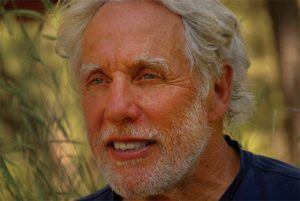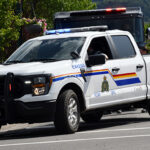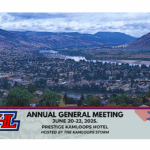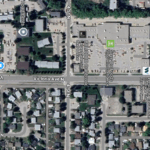Home »

Mixed reaction to grizzly trophy hunt ban
A diverse and often-heated exchange of opinions are flowing after the recent B.C. Government announcement that it is banning the trophy hunt for grizzly bears.
Regional environmental advocacy group Wildsight says it welcomes the announcement but a major question remains, while the region’s two MLAs are strongly opposed to it.

“Wildsight welcomes the ban on trophy hunting of grizzly bears, but we are unclear what a meat hunt will mean for the bears. Big-game hunters may still hunt grizzlies, taking home photos of themselves with their kill instead of the bear’s hide, head and paws,” stated John Bergenske, Wildsight Conservation Director.
“Currently, hunters are required to take home the meat from most animals killed, but not grizzly bears. Very few, if any, hunters are out to hunt grizzlies for meat. The Minister promised to consult with First Nations and stakeholders to determine next steps and details of the trophy hunt ban. Wildsight will expect to participate in these discussions to make sure the trophy hunting ban is effective.”
Bergenske said hunting isn’t the only issue facing grizzlies in the province.
“The problem facing grizzly bears, like so many species across the province, is much broader than hunting. Habitat and connectivity is key. Without significant changes in how we manage the human footprint on the land in B.C., declines will continue for many species,” he said.
“Wildsight appreciates Minister Donaldson’s commitment to moving forward with a broader consultation process on a renewed wildlife management strategy for the province. We hope that the government is ready to work with British Columbians to make wildlife a real priority, including all species, not just those that are hunted. Much more than just hunting regulations needs to change.
“Industry has dominated land use for far too long. Instead of piecemeal struggles to protect the remaining patches of old growth forest, individual wildlife corridors and critical habitats, we need to sit down together for land-use planning that integrates forestry, mining, roads and recreation. Real wildlife management will require changes that include additional protected areas and carefully managed connectivity across the landscape,” Bergenske said in a media release.
Columbia River-Revelstoke MLA Doug Clovechok says the NDP/Green provincial government is merely pandering to its Lower Mainland base and has not thought the matter through, with potential other impacts harming grizzlies.

“The announcement that the NDP will ban grizzly bear hunting signaled a sad day for conservation and the future of wildlife management in our province. In addition their announcement is beyond ambiguous in nature and I believe it is deliberately unclear. It is disappointing that Doug Donaldson, the Minister of Forest Lands and Natural Resource Operations, did not have the courage to be specific and tell people what this really means,” Clovechok told e-KNOW.
“For many of my constituents this will signal an attack on what is part of our long seated culture in the Kootenays that includes hunting, fishing and trapping. I can guarantee you they will not be happy as the NDP continue to drive wedges between rural and urban British Columbians.
The entire discussion of ‘trophy’ hunting truly obscures the real reason British Columbia has a hunt in the first place. The grizzly hunt enables wildlife managers to do what they are paid for and that is to manage populations that are expanding beyond the carrying capacity of the habitat in certain parts of the province.
“The impact of this poorly thought out policy will be to force our Conservation Officers to kill more bears that find their ways into our valley bottoms where they would not normally be. The NDP clearly did not listen to the professional wildlife managers in government, who would have told them that excess bears are pushed out of grizzly bear territories by aggressive boars and sows and when there is no space for them to flee to, they go where they become nuisances and are killed on the highway, the railway or by Conservations Officers. That is why a conservative, regulated hunt is supported by most bear biologists.”
Clovechok said urban voters do not understand what effective wildlife management involves, and the government is relying on that, while rural residents take it on the chin.
“The NDP have clearly not used science for this decision and in doing so have made this decision nothing more than political pandering to primarily an emotional urban voter that likely has little if any understanding of effective wild life management,” he said, adding, “If they are willing to base wildlife management decisions on politics for this species, we can expect they will use politics to decide other fish and wildlife policies. In the end fish and wildlife and our rural constituents will continue to suffer from this cheap political interference with professional wildlife management.
“I often do not find common ground on issues with Wildsight but I do agree with Mr. Bergenske that wildlife management is about more than hunting seasons and I hope the NDP will deliver on the new model for wildlife management that we announced before the election and not politicize that too. I will wait to see what they do, but they have already proven they cannot be trusted,” Clovechok said.
Kootenay East MLA Tom Shypitka said the “ban on retrieving the hide of a bear, and the purpose of the hunt to be exclusively for meat only, is disappointing and hypocritical.

“To start off, the term ‘trophy’ hunt is misleading and misrepresentative of the purpose of a grizzly hunt. First and foremost the purpose of a grizzly hunt is a scientific management tool to address the population of bears that exceed the carrying capacity of a specific regions habitat.
“The secondary purpose or by-product of this primary purpose is to provide a hunting experience for individuals and families to enjoy and to create and sustain a few small businesses. The hunters and small businesses understand that their access to a hunt depends solely on this carrying capacity and that bear populations must be protected when bears are under this capacity whereas no tags or licences will be issued to hunt,” Shypitka said.
“Currently, there about 250 grizzly bear harvested in one year in British Columbia. The current count on grizzly bear populations are around 15,000 and many say that is a very conservative number.”
Shypitka explained why he believes the NDP government is hypocritical.
“The hypocrisy is that the NDP blamed hunters for only taking the hide, head and paws and not utilizing more of the animal, when what this new policy states is to leave everything but the meat behind, which is about 70% of the animal.
“The point is, that it’s not the grizzly hunt that is hazardous to the grizzly bear populations in some areas… the real issue is habitat and the lack of proper management,” he said, echoing Clovechok that this ban will lead to more problems.

“When grizzly populations exceed their carrying capacity, many will be pushed to the front country where human interaction will occur. This will lead to Conservation Officers destroying these beautiful creatures whose carcasses end up in the landfill. These over populations also decimate the ungulate population where mature grizzlies have been reported to kill around 34 moose and caribou calves in a 45-day period,” he said.
“As MLA for Kootenay East, I will be working on legislation that will provide a model to fund proper science that in turn will provide accurate wildlife counts, mapping that will identify wildlife corridors, breeding and birthing areas, important food sources, riparian areas, as well as proper science based decision in regards to hunting practices and regulations.
“This latest disappointing and hypocritical policy on grizzly bear hunting does absolutely nothing to grizzly populations other than provide a weak attempt to appease environmentalists and uninformed urbanites. This is nothing more than a political carrot offered up with zero thought behind it,” Shypitka said, again reflecting his northern colleague’s position that the ban is more about appeasing urban voters than anything else.
“Unfortunately, what this new policy really creates is further polarization between urban and rural voters (generally speaking). Hunters have to be recognized for the respect they have for the land and wildlife. They live and breathe this lifestyle and truly understand the balance that must be created to enhance habitat and wildlife.
Lastly, we have to careful with the term ‘trophy’ and I will advocate to have this term removed. It is misrepresentative and misleading. This description can be used for almost any form of hunting or trapping. I believe if this term is accepted then Grizzly Bear hunting won’t be the last attempted ban we will have. This terminology could affect Elk, Moose, Deer, etc., including fishing!
“Let’s have a government that understands a science based approach and does not use people’s emotions to dictate policy and voter support,” Shypitka concluded.
– Ian Cobb/e-KNOW







